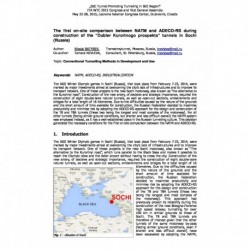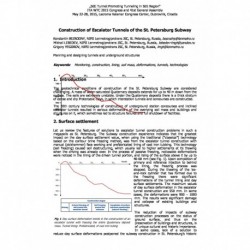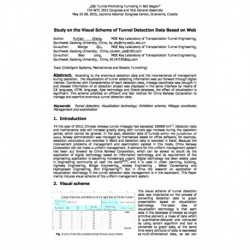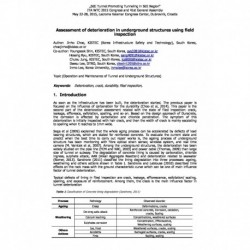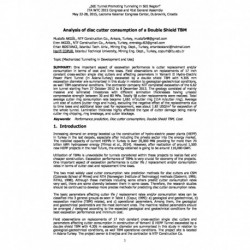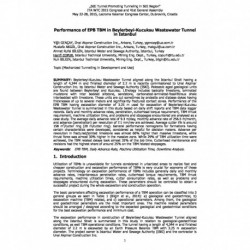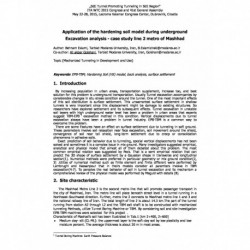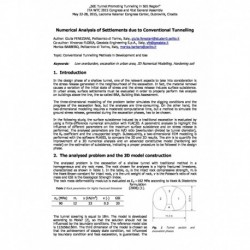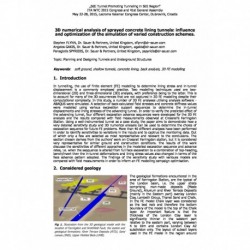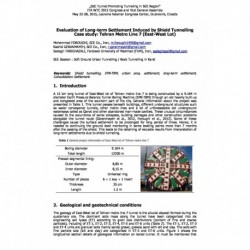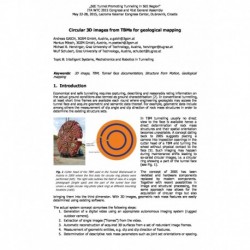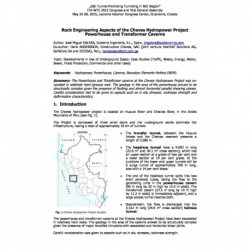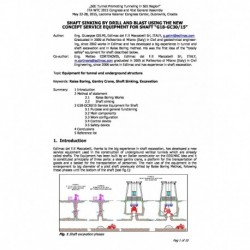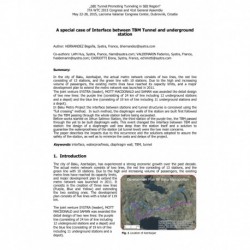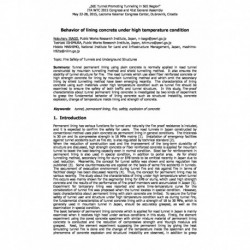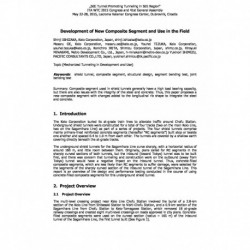No document
Search & filter
Search for a publication
Search & filter
World Tunnelling Congress
WTCThere are 1984 documents.
-
The first on-site comparison between NATM and ADECO-RS during construction of the “Dubler Kurortnogo...
Abstract: The XXII Winter Olympic games in Sochi (Russia), that took place from February 7-23, 2014, were marked by major investments aimed at overcoming the city’s lack of infrastructures and to improve its transport network. One of these projects is the new Sochi motorway, also known as “The alternative to the Kurortnyi road”, which runs parallel to the Black Ssea and makes it possible to reach the...
0,00 € -
Construction of Escalator Tunnels of the St. Petersburg Subway
Abstract: The geotechnical conditions of construction of the St. Petersburg Subway are considered challenging. A mass of water-saturated Quaternary deposits extends for up to 40 m down from the surface. The soils are extremely unstable. Under the Quaternary deposits there is a thick stratum of dense and dry Proterozoic clays, in which interstation tunnels and concourses are constructed. The 20th century...
0,00 € -
Study on the Visual Scheme of Tunnel Detection Data Based on Web
Abstract: Till the year of 2013, Chinese railways tunnel mileages had exceeded 100000 km. Detection data and maintenance cost will increase greatly along with tunnels age increase during the operation period, which cannot be ignored. In the past, detection data of tunnels railway administration was managed by themselves based on office software, for example, detection conclusions are recorded in Word and...
0,00 € -
Assessment of deterioration in underground structures using field inspection
Abstract: As soon as the infrastructure has been built, the deterioration started. The previous paper is focused on the influence of carbonation for the durability (Choo et al, 2014). This paper is the second part of the deterioration assessment related with the state of filed inspection: crack, leakage, effloresce, exfoliation, spalling, and so on. Based on the design approach of Duracrete, the...
0,00 € -
Analysis of disc cutter consumption of a Double Shield TBM
Abstract: Increasing demand on energy boosted up the construction of hydro-electric power plants (HEPP) in Turkey in the last decade, especially after including the private sector into the energy market. The installed capacity of current HEPPs in Turkey is over 20,000 MW providing for more than 70 billion kWh hydropower energy (Yilmaz et al., 2014). However, after realization of around 1,500 new HEPP...
0,00 € -
Performance of EPB TBM in Beylerbeyi-Kucuksu Wastewater Tunnel in Istanbul
Abstract: Utilization of TBMs is unavoidable for tunnels considered in urbanized areas to realize fast and cheaper construction and excavation performance of TBMs is very crucial for economy of these projects. Terminology on excavation performance of TBMs includes generally daily and monthly advance rates, instantaneous penetration rates, cutterhead torque requirements, TBM thrust requirements, machine...
0,00 € -
Application of the hardening soil model during underground Excavation analysis - case study line 2 metro of Mashhad
Abstract: By increasing population in urban areas, transportation supplement, increase too, and best solution for this problem is underground transportation. Usually Tunnel excavation accompanies by considerable changes in situ stress condition around the tunnel. One of the most important effects of this soil distribution is surface settlement. This unwarranted surface settlement in shallow tunnels is...
0,00 € -
Numerical Analysis of Settlements due to Conventional Tunnelling
Abstract: In the design phase of a shallow tunnel, one of the relevant aspects to take into consideration is the stress release generated in the neighbourhood of the excavation. In fact, the material removal causes a variation of the initial state of stress and the stress release induces surface subsidence. In urban areas, surface settlements must be evaluated in order to properly perform risk analysis...
0,00 € -
3D numerical analysis of sprayed concrete lining tunnels: influence and optimization of the simulation of varied...
Abstract: In tunnelling, the use of finite element (FE) modelling to determine lining stress and in-tunnel displacement is a commonly employed practice. Two modelling techniques used are two-dimensional (2D) and three-dimensional (3D) analysis, with preference being to the latter. This is to account for many of the 3D occurrences that are not captured in 2D FE modelling despite their computational...
0,00 € -
Evaluation of Long-term Settlement Induced by Shield Tunnelling Case study: Tehran Metro Line 7 (East-West Lot)
Abstract: A 12 km long tunnel of East-West lot of Tehran metro line 7 is being constructed by a 9.164 m diameter Earth Pressure Balance Tunnel Boring Machine (EPB-TBM) through an old heavily built-up and congested area of the southern part of the city. General information about the project was presented in Table 1. This tunnel passes beneath buildings, different underground structures such as water...
0,00 € -
Circular 3D images from TBMs for geological mapping
Abstract: Economical and safe tunnelling requires capturing, describing and reasonably rating information on the actual ground conditions also termed as ground characterisation In conventional tunnelling, at least short time frames are available each round where engineering geologists may access the tunnel face and acquire geometric and semantic data thereof. For example, geometric data include among...
0,00 € -
Rock Engineering Aspects of the Cheves Hydropower Project Powerhouse and Transformer Caverns
Abstract: The Cheves hydropower project is located on Huaura River and Checras River, in the Andes Mountains of Peru (see Fig. 1). The Project is composed of three small dams and the underground works dominate the infrastructure, having a total of approximately 19 km of tunnels: The , between the Huaura Intake and the Checras reservoir presents a length of 2,580 m. The have a 9.693 m long (22.6 m and...
0,00 € -
Shaft sinking by drill and blast using the new concept service equipment for shaft “G18-GC30/15”
Abstract: Edilmac dei F.lli Maccabelli, thanks to the big experience in shaft excavation, has developed a new service equipment used in the construction of underground vertical tunnels which are already called shafts. The Equipment has been built by an Italian constructor on the EDILMAC idea and it is constituted principally of three parts: a steel gantry crane, a platform for the transportation of goods...
0,00 € -
A special case of Interface between TBM Tunnel and underground station
Abstract: The city of Baku, Azerbaijan, has experienced a strong economic growth over the past decade. The actual metro network consists of two lines, the red line consisting of 13 stations, and the green line with 10 stations. Due to the high and increasing volume of passengers, the existing metro lines have reached its capacity limits, and major development plan to extend the metro network was launched...
0,00 € -
Behavior of lining concrete under high temperature condition
Abstract: Permanent lining has various functions for tunnel and naturally the fire proof resistance is included, and it is expected to confirm the safety for users. The road tunnels in Japan constructed by conventional method uses plain concrete as permanent lining in general conditions. The thickness is 30 cm and its compressive strength is 18 MPa mainly [1]. Installation of emergency facilities against...
0,00 € -
Development of New Composite Segment and Use in the Field
Abstract: The Keio Corporation buried its at-grade train lines to alleviate traffic around Chofu Station. Underground shield tunnels were constructed for a total of four tracks (two on the main Keio Line, two on the Sagamihara Line) as part of a series of projects. The four shield tunnels comprise mainly primary-lined reinforced concrete segments (hereafter “RC segments”) built atop or beside one another...
0,00 €

